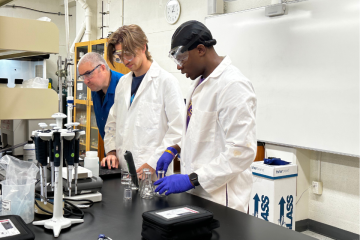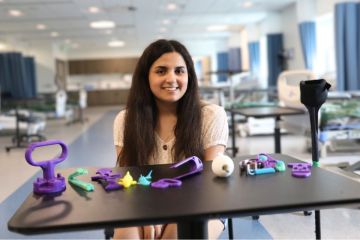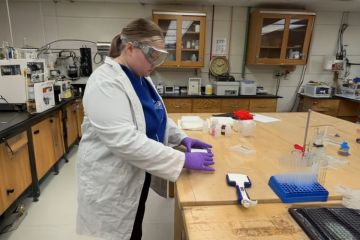Engineering Professor Receives Artificial Intelligence Award

Dr. Sachin Patil, associate dean of School of Engineering and associate professor of chemical engineering at Widener University in Chester, Pa., was named one of ten recipients of the first Artificial Intelligence Molecular Screen (AIMS) Awards.
Atomwise launched the Artificial Intelligence for Drug Discovery program in the summer as a way to collaborate on various innovative projects. The goal of this program is to broaden the pool of scientists pursuing drug discovery. To advance this goal, Atomwise will award researchers with a customized virtual screen using cutting-edge Artificial Intelligence (AI) technology, free chemical compounds for physical screening, and technical support.
The award supports Patil’s cancer research targeting the PD-1 protein, which is a natural break on the immune cells that cancer cells used to avoid their destruction.
“Targeting this protein escape mechanism represents a fundamentally novel therapeutic approach for selective activation of the innate immune system for treating variety of cancers,” Patil said. “The support of Atomwise will allow us to discover any PD-1 inhibitors that may offer several advantages over currently approved immunotherapies that are primarily antibody-based. The advantages of potential small-molecule chemical compounds as compared to antibodies include significantly lower cost, higher oral bioavailability, better tumor infiltration, and relatively shorter half-life that is especially helpful in controlling any potential adverse immune reactions.”
Through this award Patil will receive customized small molecule virtual screening through Atomwise's AtomNet technology, 72 physical samples of small molecules predicted to bind to his specific target protein, support from medicinal chemists and computational biologists, and additional small molecules and support contingent on progress.
Being one of the first ten awardees of this globally competitive program is a significant achievement. This award further validates the research approach against this challenging therapeutic target that me and my research group, which includes eight chemical engineering and computer science students, have been working on.
—Sachin Patil
Researchers at universities and non-profit research institutes often have support for basic research and clinical research, but there is little funding and many barriers for the intermediate stages of drug discovery and development. These barriers include a lack of knowledge of how to perform drug discovery and lead optimization, the cost of chemical compounds, the need to develop high throughput assays, and insufficient technical support. In response, the AIMS Awards were created to harness AI technology to facilitate and encourage drug discovery for all scientists.
Atomwise’s technology uses deep learning neural networks to perform structure-based predictions (AtomNet™). This AI technology can virtually screen millions of chemical compounds to select those that are most likely to bind a target protein with high affinity and high specificity. It will help researchers pursue projects at a fraction of the cost, time, and resources of traditional approaches.
Atomwise has launched 27 discovery projects with innovative organizations, including Merck and Harvard, advancing research in areas as diverse as Ebola, multiple sclerosis, leukemia, and now, fungicides and nematicides. Today, through its many partnering programs, Atomwise is actively seeking new collaborators to address the global health challenges of our time with the power of artificial intelligence.



